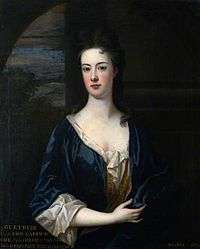Sir Coplestone Bampfylde, 3rd Baronet
Sir Coplestone Warwick Bampfylde, 3rd Baronet (c. 1689 – 7 October 1727)[1] of Poltimore and North Molton, Devon, was a British High Tory politician[2] who served as Member of Parliament for Exeter (1710-1713) and for Devon (1713-1727).
Origins
He was the eldest son of Colonel Hugh Bampfylde (c. 1663–1691) (son and heir apparent of Sir Coplestone Bampfylde, 2nd Baronet (c. 1633–1692), whom he predeceased) by his wife Mary Clifford, daughter of James Clifford[2] of Ware.[3]
Career
Bampfylde was educated at Christ Church, Oxford.[4] In 1692, his father having died the year before, he succeeded his grandfather Sir Coplestone Bampfylde, 2nd Baronet (c. 1633–1692) as 3rd baronet.[4] In 1710 he was elected MP for Exeter which seat he held until 1713.[5] Subsequently he sat for Devon until his death in 1727.[6] During The Fifteen, he was suspected of Jacobite sympathies and was temporarily imprisoned.[2]
Inheritance
As well as having inherited his grandfather's extensive Devonshire estates, including Poltimore and North Molton, he also inherited the estates of his distant cousin Warwick Bampfylde (1623-1695) of Hardington, Somerset (5th in descent from Peter Bampfylde of Hardington, younger brother of Sir William I Bampfylde (d.1474) of Poltimore[7]), to whom he acted as executor.[8]
Marriage & progeny

In June 1716 he married Gertrude Carew, daughter of Sir John Carew, 3rd Baronet (d.1692)[2] of Antony, Cornwall. They had two daughters and a son and heir Sir Richard Warwick Bampfylde, 4th Baronet (1722–1767).[2]
Death & succession
Bampfylde died on 7 October 1727 and was buried at Poltimore a week later.[4] He was succeeded in the baronetcy by his son Sir Richard Bampfylde, 4th Baronet (1722–1767).[9]
References
- ↑ "Leigh Rayment – Baronetage". Retrieved 3 June 2009.
- 1 2 3 4 5 Eveline Cruickshanks, Stuart Handley and D. W. Hayton, ed. (2002). The House of Commons, 1690–1715. vol. III. Cambridge: Cambridge University Press. pp. 125–126.
- ↑ Vivian, Lt.Col. J.L., (Ed.) The Visitations of the County of Devon: Comprising the Heralds' Visitations of 1531, 1564 & 1620, Exeter, 1895, p.40
- 1 2 3 "ThePeerage – Sir Coplestone Warwick Bamfylde, 3rd Bt". Retrieved 18 February 2007.
- ↑ "Leigh Rayment – British House of Commons, Essex". Retrieved 4 June 2009.
- ↑ "Leigh Rayment – British House of Commons, Devonshire". Retrieved 4 June 2009.
- ↑ Vivian, pp.38-9
- ↑ Vivian, p.40
- ↑ Debrett, John (1824). Debrett's Baronetage of England. vol. I (5th ed.). London: G. Woodfall. p. 140.
| Parliament of Great Britain | ||
|---|---|---|
| Preceded by Nicholas Wood John Harris |
Member of Parliament for Exeter 1710–1713 With: John Snell |
Succeeded by John Rolle Francis Drewe |
| Preceded by Sir William Courtenay, Bt John Rolle |
Member of Parliament for Devon 1713–1727 With: Sir William Courtenay, Bt |
Succeeded by Sir William Courtenay, Bt John Rolle |
| Baronetage of England | ||
| Preceded by Coplestone Bampfylde |
Baronet (of Poltimore) 1692–1727 |
Succeeded by Richard Bampfylde |